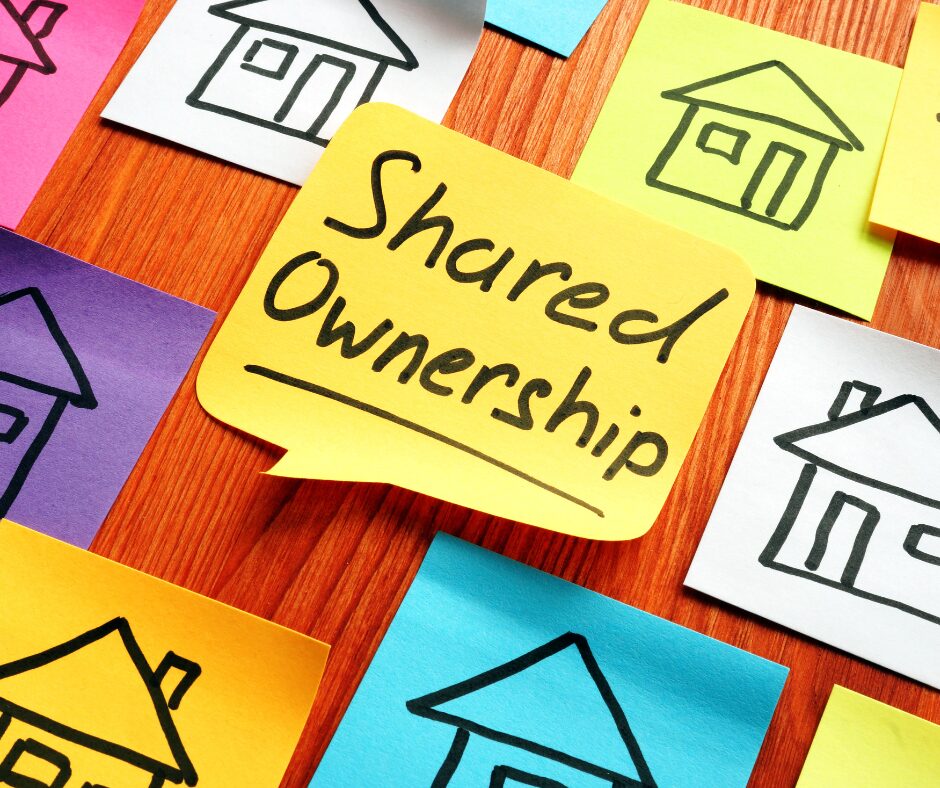Shared ownership is a popular option for those looking to get on the property ladder. But what exactly is shared ownership, and what are the pros and cons of this type of ownership? In this article, we’ll explore the ins and outs of shared ownership and help you decide if it’s the right choice for you.
What is Shared Ownership?
Shared ownership is a plan supported by the government. This allows individuals to purchase a portion of a property (typically 25-75%) and rent the remaining part. This allows individuals to get on the property ladder with a smaller deposit and mortgage, making it a more affordable option for many.
How Does Shared Ownership Work?

To join shared ownership, you need to meet specific requirements. For instance, your yearly household income should typically be below £80,000 if you live outside London and below £90,000 if you live in London (but may differ dependant on area and housing association). You must also be a first-time buyer or a previous homeowner who cannot afford to buy a home on the open market.
After getting approval for shared ownership, you can pick a property from the available properties of a housing association. You will then purchase a share of the property and pay rent on the remaining share. You can increase your share of the property over time through a process called “staircasing”, where you buy additional shares until you own the property outright.
Pros
More Affordable Option
Shared ownership is good because it lets people buy a house with less money down and a smaller loan. This makes it a more affordable option for those who may not be able to afford a traditional mortgage.
Opportunity for Homeownership
It provides an opportunity for homeownership for those who may not have been able to afford it otherwise. This can be especially beneficial for first-time buyers who may struggle to save for a large deposit.
Potential for Equity Growth
As you increase your share of the property through staircasing, you also have the potential for equity growth. This means that if the value of the property increases, your share of the property will also increase in value.
Flexibility to Sell
If you decide to sell your shared ownership property, you have the flexibility to do so. You can sell your share of the property or sell the property outright, depending on your circumstances.
Cons of Shared Ownership
Limited Property Options
Shared ownership properties are limited and may not be available in the area or type of property you desire. This can make it difficult to find a property that meets your needs and preferences.
Additional Costs
Besides paying your mortgage and rent, you might have to pay other fees if you have shared ownership. These fees can include service charges and ground rent. These costs can add up and may make shared ownership less affordable in the long run.
Restrictions on Renting Out the Property

Can you rent shared ownership property out? If you decide to rent out your shared ownership property, you may face restrictions. Some housing associations do not allow shared ownership properties to be rented out, while others may require you to own a certain percentage of the property before you can rent it out.
Potential for Negative Equity
While there is potential for equity growth, there is also the risk of negative equity. If the value of the property decreases, your share of the property will also decrease in value. This can make it difficult to sell the property or increase your share through staircasing.
Does It Suit You?
Whether shared ownership is the right choice for you depends on your individual circumstances and preferences. Here are some factors to consider when deciding if shared ownership is the best option for you.
Your Financial Situation
Shared ownership may be a good option if you have a lower income and struggle to save for a large deposit. If you have a steady income and can afford the extra expenses of shared ownership, it could be a good choice for you.
Your Long-Term Plans
If you plan on staying in the property for a long time, this may not be the best option. The additional costs and potential for negative equity may make it less affordable in the long run.
Your Desire for Flexibility
If you like being flexible and being able to sell or rent out your property, shared ownership may not be the best option for you. Restrictions on renting out the property and potential difficulties with selling may limit your options.
Conclusion
Shared ownership can be a great option for those looking to get on the property ladder. It offers an opportunity for homeownership and can be more affordable than traditional mortgages. However, it also has its drawbacks, such as limited property options and additional costs. Consider your individual circumstances and preferences before deciding if shared ownership is the right choice for you.
Shared Ownership Peabody are a fine example of a company who specialise in this method of buying, read more about them here – Peabody
If you are looking to Buy or Sell a home in Daventry or Rugby, or you would just like to some advice on moving or the housing market, call 01327 624275 or 01788 486100. Alternatively use our contact form here and we’ll call you at a convenient time.




